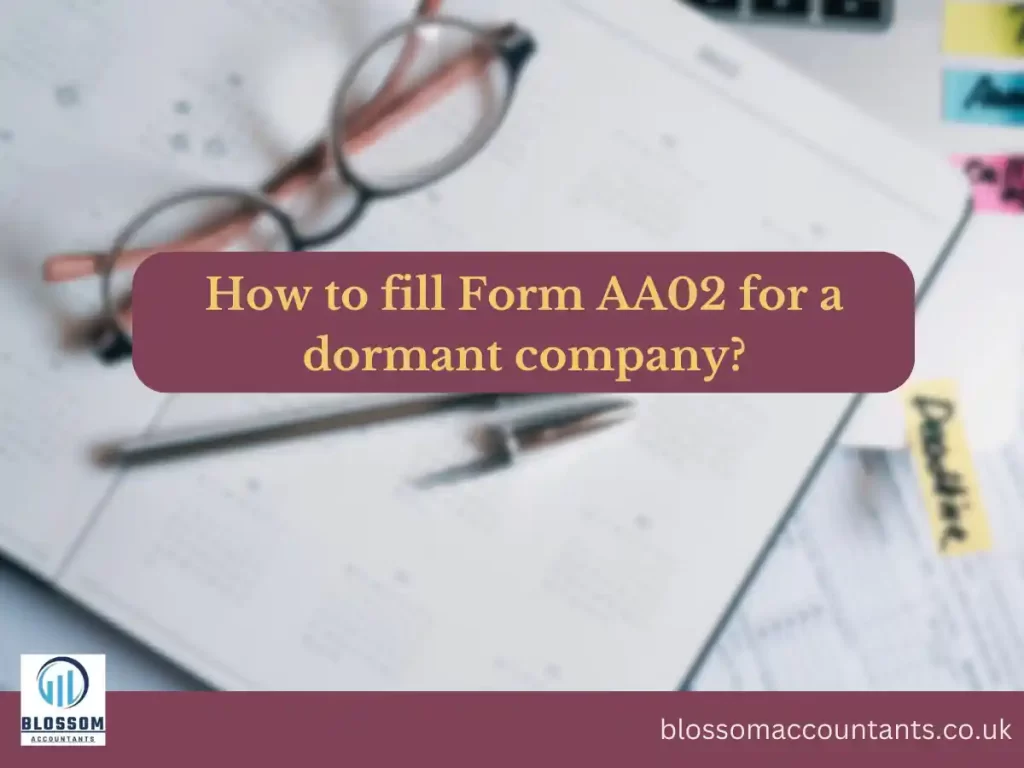Filing annual accounts for a dormant company is a crucial compliance requirement in the UK. Even if a company has been dormant or inactive during a financial year, it is still obligated to submit its annual accounts to Companies House.
The method and standards for submitting yearly accounts for a defunct corporation are discussed in this article. It also covers the specific form required, how to complete Form AA01 for a defunct firm, and the consequences of failing to file the annual accounts on time.
Table of Contents
Which form is required for a dormant company to file annual accounts?
For filing annual accounts, a dormant company in the UK typically uses Form AA02, which is specifically designed for dormant companies. This form is used to provide a snapshot of the company’s financial position, even if there have been no significant transactions during the financial year.
How to fill Form AA02 for a dormant company?
Company Details:
Begin by providing the full name of the company, its registered number, and the date to which the accounts are made up.
Balance Sheet:
Complete the balance sheet section, including details of the company’s assets, liabilities, and shareholders’ funds. For a dormant company, these amounts are usually nil or zero.
Statement of Financial Position:
Provide a statement of the company’s financial position, confirming that the company has been dormant throughout the financial year. Indicate the reason for dormancy, such as no significant accounting transactions.
Signature:
The form must be signed by a director or the company secretary to certify its accuracy.
Submission:
Once completed, submit Form AA02 to Companies House either by post or electronically using their online filing service.

What happens if we do not file the annual accounts of a dormant company?
Failing to file annual accounts for a dormant company can have several implications:
Penalties:
Companies House may impose penalties for late filing or non-filing of annual accounts. The amount of the penalty increases with the length of the delay, and repeated failures can lead to higher penalties.
Prosecution:
Persistent non-compliance with filing requirements may result in prosecution, which can lead to fines or other legal consequences for the company and its officers.
Loss of Limited Liability Protection:
Failure to file annual accounts may jeopardize the company’s limited liability protection, exposing its directors and shareholders to personal liability for the company’s debts.
Creditworthiness and Reputation:
Not filing annual accounts can negatively impact the company’s creditworthiness and reputation. Potential investors, lenders, or business partners may view non-compliance as a red flag, affecting future business opportunities.
Difficulty in Dissolution:
If the company wishes to dissolve or strike off its name from the Companies Register, it must have filed all outstanding annual accounts. Failure to do so may impede the dissolution process.
Compliance Issues:
Non-compliance with filing requirements can trigger further scrutiny from regulatory bodies, such as HM Revenue and Customs (HMRC) or the Insolvency Service, potentially leading to additional investigations or audits.

Conclusion of File Dormant Company Annual Accounts:
Filing yearly accounts for an inactive business is required by UK company law to guarantee compliance. An inactive firm can offer a snapshot of its financial status using Form AA02, even if no substantial transactions occurred during the fiscal year. Failure to file yearly accounts can result in fines, loss of limited liability protection, reputational harm, and dissolution complications. To retain good status with firms House and display openness in their financial activities, inactive firms must swiftly satisfy their filing duties.
DISCLAIMER: We have written the UK accounting and tax related details for your information only. For professional advice or for any accounting task you require, you may need to speak to a professional accountant near you who can assist you. Please read our disclaimer for more details.

